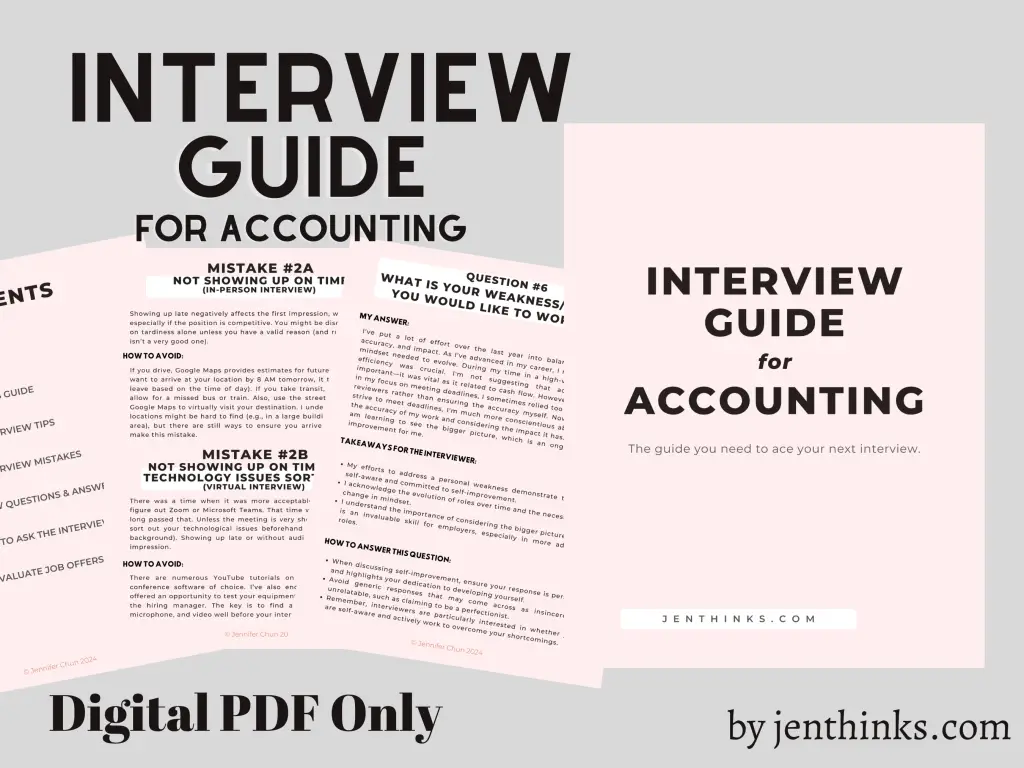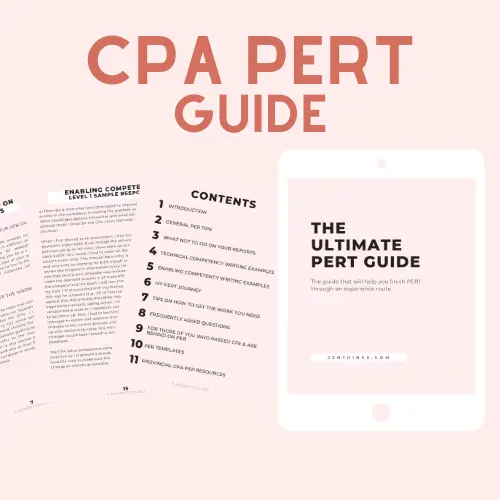Preparing for an accounting interview can be daunting, especially when you want to make a strong impression. One of the best ways to feel confident and ready for an accounting interview is to familiarize yourself with the types of questions you might encounter and to practice your responses.
In this post, I’ll cover some of the top accounting interview questions and provide tips on how to answer them effectively. Whether you’re a recent graduate or an accountant looking for change, these insights will help you present your best self and increase your chances of landing the job.
Accounting Interview Question #1: Tell Me About You/Your Experience
I don’t think I have ever been to an accounting interview without being asked a variation of this question: tell me about you/your experience. This is a common question as it serves as an excellent icebreaker. It allows the interviewer to learn more about you and your experience beyond what fits on your resume. This also gives you a chance to properly introduce yourself before diving into more role-specific and/or technical questions.
Below are tips on how to answer “Tell Me About You/Your Experience”:
- Structure your answer in a chronological order to ensure it’s easy for the interviewer to follow.
- Avoid unnecessary details such as team size or an overview of the company’s products unless it directly relates to the skills or experience you wish to emphasize.
- Highlight any promotions as they indicate that your performance has been consistently recognized.
- Tailor your answer to the role you’re interviewing for to highlight as much relevant experience as possible, making it clear to the interviewer why you’re a great fit for the role right from the start.
Struggling with accounting interviews? Gain the edge you need with my interview guide created for accounting. It includes 25 most common accounting interview questions and answers, interview mistakes, tips and more!
Accounting Interview Question #2: Why Are You Leaving Your Current Job?
People are naturally curious. So when you show up to an interview, indicating you want a change, it is only natural for the interviewer to ask why you are leaving your current job. I have left jobs for a number of reasons: lack of growth, boredom with the industry, toxic working environment, change in management, etc. More often than not, I looked for a new job for a mixture of the reasons mentioned. This is one of those questions where you should respond strategically while remaining truthful. It’s not good practice to simply state you disliked your boss, as such statements can be easily misunderstood. Your statement could be true, but I am sure you can think of other reasons as well.
Below are tips on how to answer “Why Are You Leaving Your Current Job”:
- Stay genuine without sharing details that can be easily misunderstood (e.g., expressing a dislike for management without stating a valid reason).
- Explain your reasons in a way that shows you have a clear idea of what you are looking for in your next role.
- Highlight how you plan on leveraging your skills and experience in your next position.
- Remember, it’s not always about what didn’t work at your old job; sometimes it’s about what you want from your next job.
Accounting Interview Question #3: What Would You Say Are Your Strengths For This Role?
You should be familiar with the job description before showing up to an interview, as it helps you position yourself as a strong candidate. When the interviewer asks you what your strengths are for the role, you should be able to tie your experience and skills directly to what they are looking for. For example, if the company is publicly traded, be sure to highlight any prior experience at a public company or private companies that adopted IFRS.
Below are tips on how to answer “What Would You Say Are Your Strengths For This Role”:
- Be specific about skills and experience and clearly define how they make you a suitable candidate for the role; reference specific tasks you have performed that are relevant to the role you are interviewing for.
- Emphasize soft skills and highlight qualities such as reliability and high emotional intelligence, which are often just as important as technical skills, especially in leadership roles.
- Discuss informal leadership experiences, such as mentorship and training, if you lack formal experience.
Accounting Interview Question #4: What Is Your Weakness/An Area You Would Like To Work On?
This is often regarded as one of the trickiest questions to answer, as candidates struggle between being sincere and being strategic. While you shouldn’t claim to be flawless, you also shouldn’t highlight a weakness that is detrimental to succeeding in the role you want. For example, accuracy and attention to detail are highly valued traits in accounting. You might not want to tell the interviewer how careless you are (if that’s the truth, this is definitely something you should actively work on), as they will be worried about the quality of your financial work.
Below are tips on how to answer “What Is Your Weakness/An Area You Would Like To Work On”:
- When discussing self-improvement, ensure your response is personal and highlights your dedication to developing yourself.
- Avoid generic responses that may come across as insincere or unrelatable, such as claiming to be a perfectionist.
- Remember, interviewers are particularly interested in whether you are self-aware and actively work to overcome your shortcomings.
Accounting Interview Question #5: Do You Prefer Working Individually Or With A Team?
From my years of working in accounting, I have come to realize how important it is to be able to both work individually and with a team. This is because some tasks are more suitable for solo work (e.g., financial analysis), while others are more suitable for teamwork (e.g., cross-departmental initiatives). The real question is, how adaptable are you?
Below are tips on how to answer “Do You Prefer Working Individually Or With A Team”:
- Unless the role you are applying for can be done completely individually, it’s important to highlight your flexibility in both team settings and solo work, as you will likely be part of a team.
- It’s fine to have a preference; for example, as an extrovert, I enjoy teamwork. However, acknowledging the value and your capability of working independently when necessary is crucial.



